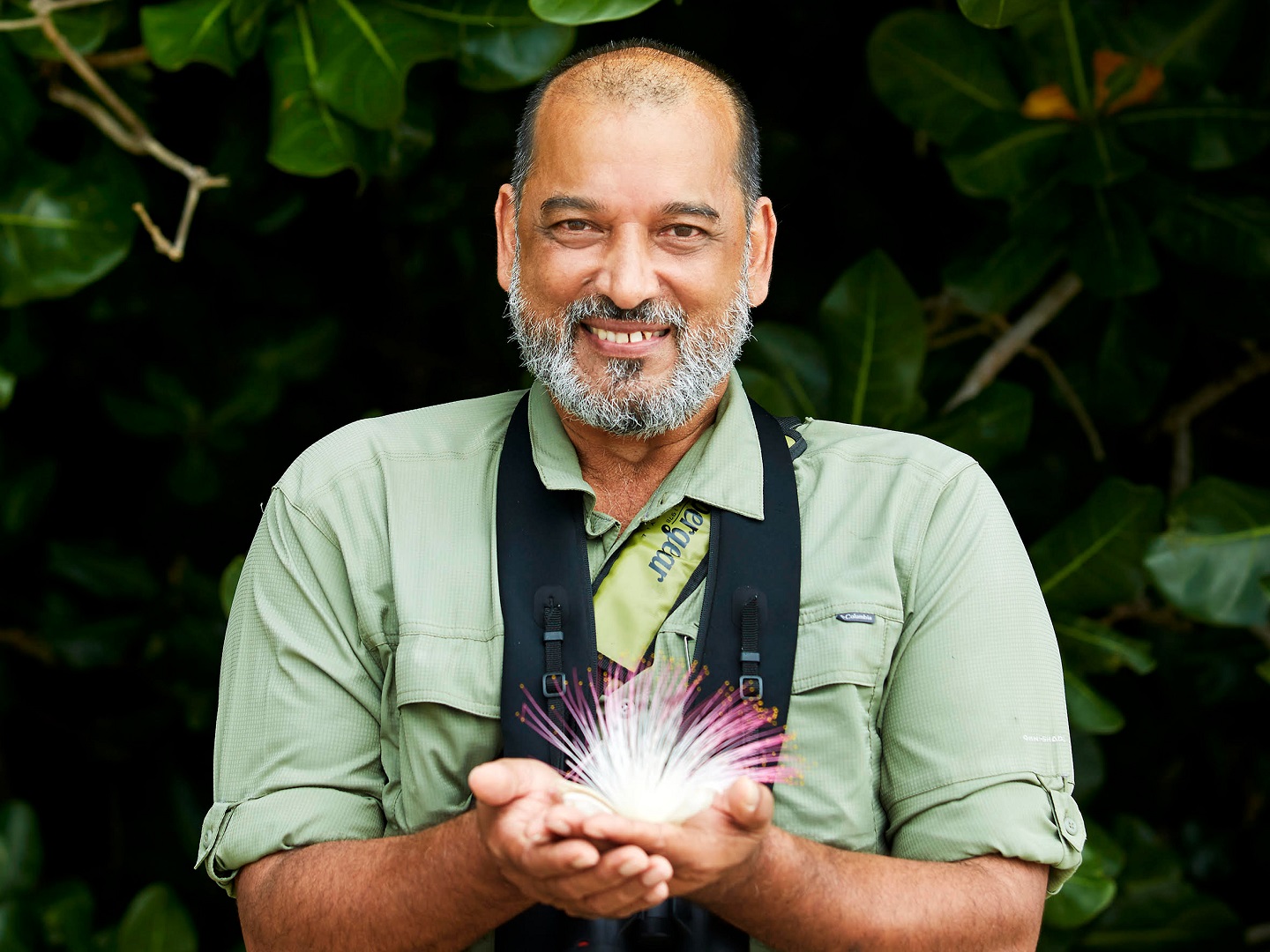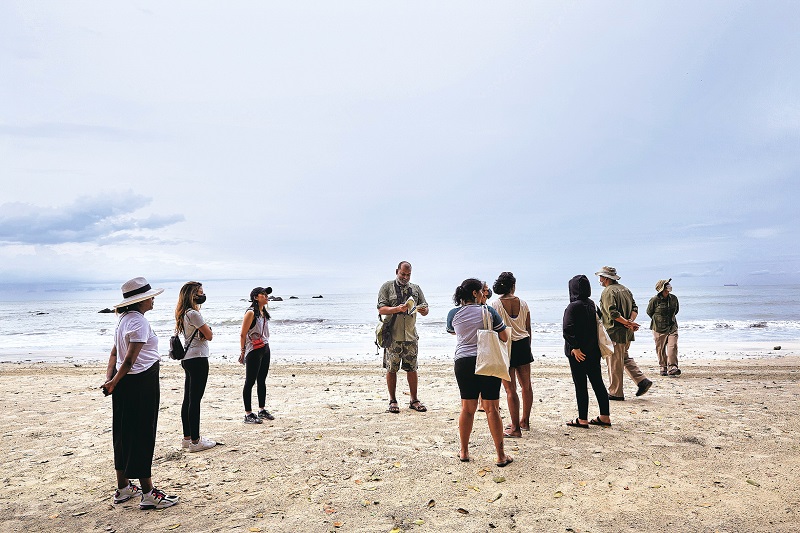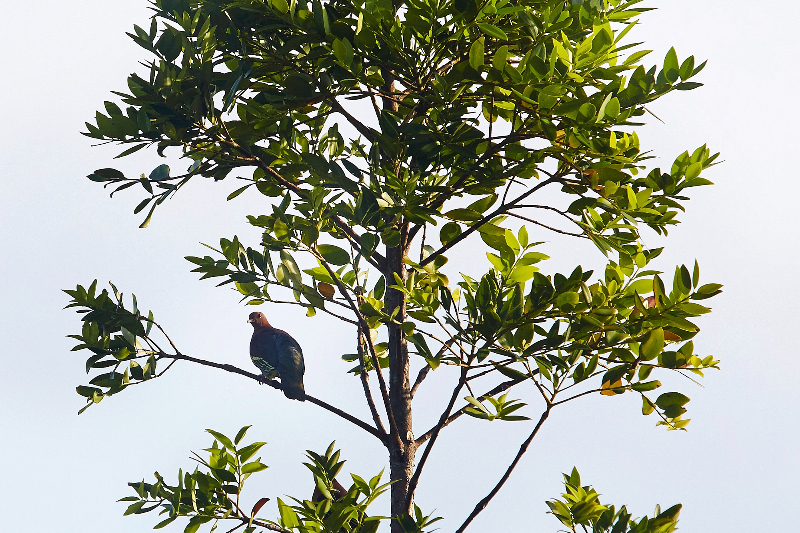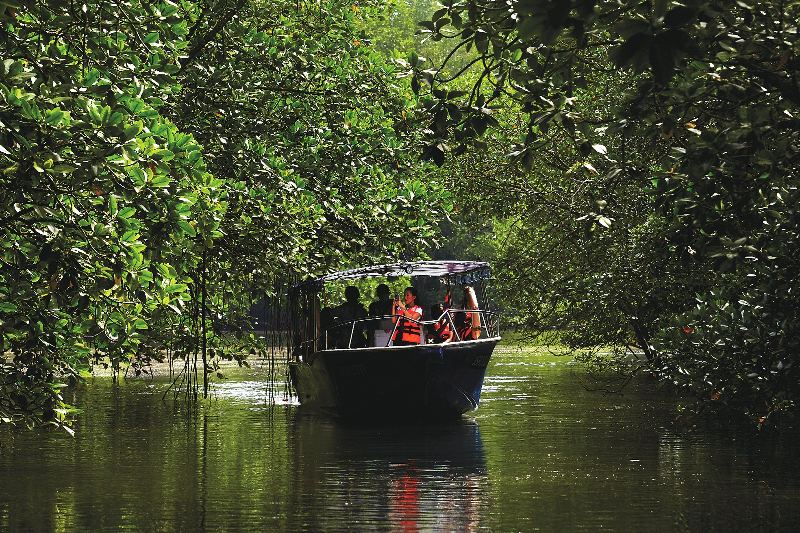
A former banker, Irshad has had a love for nature since he was a child (All photos: Soophye)
Irshad Mobarak is a master storyteller. One of the country’s most prominent naturalists, he is best known for the poetic way he describes his natural surroundings, inspiring people with his tender and evocative turns of phrase. Although most famous for holding court in Pulau Langkawi, where he has been stationed for 33 years, Irshad recently took up an invitation from Desaru Coast to be its consultant naturalist, bringing his brand of conscious conservation and environmentally sensitive tourism to the 4,000-acre seaside development in Johor.
How is he doing it? During Options’ five-day visit to Desaru Coast late last year, it was by highlighting to us the multitude of birds and other wildlife that make the larger Desaru area home, via three curated tours. On two early morning tours — one by the beach, the other on an impromptu trail through the One&Only and the Els Club Golf Course — we are surprised by the musical call of gibbons and the sight of a family of white-bellied eagles as mum feeds her hungry babies in her nest. We chat merrily as we walk, but Irshad is always tuned in to the nature that surrounds us, pulling a well-worn encyclopaedia from his bag when he hears the call of a bird to show us which species it is.
Indeed, curating tours is his main responsibility at Desaru. “Desaru Coast’s management wanted us to start some nature-related activities that could be fulfilled by Junglewalla and offered to all guests at the destination,” he begins, referring to his Langkawi-based tour company. “We thought about it for a long time, and finally agreed before the MCO started last year. We were just beginning to make some progress with tours when everything shut down, which was quite a setback.”
But the temporary cessation of the tours allowed Irshad to step back and take in the big picture at Desaru and recognise its potential as a wildlife sanctuary of sorts, combining commercial interests with environmental concerns.
_s1a9912a1.jpg

“They have big plans here, and I would like to positively influence this process,” he says eagerly. “I have seen the potential and, for me, the bigger picture is to rewild the place. There are five primates here, hornbills — I’ve recorded nearly 100 species of birds in the Desaru area just in a few weeks of birding.
“Conversation is what motivates me first, tourism is second. It is my calling, so I can see the potential of protecting what remains here by establishing a network of greenways and corridors and reforesting the area.”
Rewilding is aimed at restoring healthy ecosystems by creating wild, biodiverse spaces. It rebuilds ecosystems that have previously been modified by human disturbance, using the plant and animal life that would have been present had the disturbance not occurred. Rewilded ecosystems can help mitigate climate change by increasing carbon removal from the atmosphere and protect against climate change effects by reducing soil erosion and flood risk, for example. Rewilded ecosystems can also create socioeconomic opportunities for local communities, reduce the effects of and costs associated with environmental hazards (such as flooding), and boost human health and wellbeing by improving access to nature.
In the context of Desaru Coast, rewilding is an important aspect of the ecotourism angle that is so critical in this day and age — aside from being the right thing to do, a holiday destination that applies environmental best practices attracts a desirable type of holidaymaker, and the kind Desaru Coast hopes to draw.
When Irshad first came on board, he had not been to Desaru before and accessed Google Images to get an idea of what he was about to deal with. He was extremely discouraged by the outdated pictures of barren land but was later thrilled to learn that things were in a far better state than he had expected. Lush rainforests fringed white sandy beaches, and wildlife had somehow thrived in pockets across the development as its hotels, golf course and waterpark were constructed. From his perspective, the obvious thing to do was tap the area’s potential — by rewilding the entire development and encouraging wild flora and fauna to flourish.
“There are some incredibly special birds here, and a high number of birds of prey,” Irshad says, in his element when speaking of wildlife. “This is ex-oil palm land so you can see lots of owls, which supports the cause of sustainable pest management. There are hornbills here too, but they need nesting facilities otherwise they will migrate. I need to also find out how the gibbons got here because there are five species of primates and that’s quite unusual. As a naturalist, it’s critical to know where these animals came from, the size of the population and how we can maintain it, while of course ensuring the safety of the guests who come here.”
_s1a0991a.jpg

Just then, a white-bellied eagle swoops by, and Irshad points out that based on its colouring, it is not yet an adult. The man seems to have his sights set on both land and sea. “I am hoping to do some conservation work with dugongs around these waters; the dream is to set up a marine mammal rehabilitation centre here. It will become a facility not only for the animals, but the public as well — it gets people involved, invested and educated,” he shares.
Upon joining Desaru Coast last year, Irshad was quite specific about considering his “mandate” on a yearly basis. All these ideas take more than a year to execute, though, so he is likely to be around for a while.
A former banker, Irshad has had a love for nature since he was a child. “I remember, at the age of nine, while watching a nature documentary featuring my childhood hero David Bellamy, my father asked me what I wanted to do when I grew up. I said, ‘I would like to be just like that man on TV, a wildlife ranger’ — that was what I thought he was — ‘and I want to protect wildlife and nature’.”
After a quick detour in banking, Irshad returned to his first love after an eye-opening trip to Pulau Tioman. Since making Langkawi his permanent base more than three decades ago, he has devoted his life to helping ordinary people unlock the mysteries of the natural world. Irshad achieves this goal through Junglewalla, which specialises in wildlife tours in Langkawi and nearby islands, with a focus on the natural history of birds, plants, butterflies, rainforest fauna as well as marine fauna. He also trains budding naturalists and conservationists, and actively participates in scientific expeditions.
Irshad has appeared in a number of international documentaries such as the National Geographic Channel’s Mysteries of the Malaysian Rainforest, which was the first to film the courtship ritual of the Great Hornbills, in which a trio of Great Hornbill males engaged in a titanic clash of beaks to court a female. He was also featured in a vignette on Discovery Channel’s The Wedding Ceremony of the White Bellied Sea Eagle.
During his time in Langkawi, Irshad and his team developed a deep understanding of responsible ecotourism and how commercial interests can, and should, dovetail with conservation causes. “Conservation doesn’t have to be a bleeding fund,” he explains. “Once it’s used in a proper way, it can bring people to stay and contribute to an initial seed fund — it translates to room stays, to media attention and the place begins to become well-known. Desaru Coast, for example, has the potential for nature photography to grow. But, this hinges on us introducing best practices and showing tourists what works for them to get the kind of holiday they seek.”
_s1a0644a.jpg

This means tourism with minimal impact on the environment. On our mangrove tour with Irshad, one of the operators was so eager to show us a stingray that he lifted it out of the water, and placed it in our boat for a little longer than we were comfortable with. Although the guide’s intention was to educate, Irshad says his methods were detrimental to the animal itself. This is often the case.
“Through the years, we have begun to understand best practices better,” he shares. “We now know it’s wrong to feed the eagles and monkeys, we know the ideal speed of the boats so it doesn’t bother aquatic life, [we know] how we can best position the boats to spot dolphins … there are so many things that we have learnt over the years.
“Feeding animals, reaching out to them is a very human emotion and I don’t want to discourage the good intentions here. But we need to direct that compassion properly. In communicating with the on-ground operators here in the mangrove swamps, we want to explain how they can showcase the wildlife that lives there without putting them at risk.”
Desaru Coast has the capability of establishing new standards for responsible ecotourism, Irshad says, because of its unique natural surroundings. Just like how he draws knowledge gained from his experiences in Langkawi, Desaru will one day be the new reference point for how the guest, wildlife and hotel operator can benefit when things are done well.
“The underlying issues are basically the same,” he says, comparing both destinations. “At Desaru, the emphasis is on reforesting in a big way. The similarities include the corridors we can put in place to connect pockets of wildlife, but what we can learn about the primates here can be practised in Langkawi. We want to share information with the whole country, and if we don’t initiate this information sharing, it will never happen — someone must start. At the end of the day, people want to do good and hotels want to get on the conservation wagon, but they need guidance and hopefully, we [will be] able to provide the opportunities.”
As the bigger picture continues to unfold in the background, Irshad is happy to continue with his on-ground tours. “It wins hearts,” he says. “Once you win hearts, the battle is won. When you talk about the white-bellied eagles and the many babies they’ve had, how long they’ve been together, you develop a connection. Guests want to come back and see how they are doing. We need that connection because once you win a friend for nature, it is forever.”
This article first appeared on Apr 18, 2022 in The Edge Malaysia.


